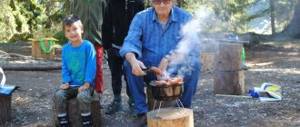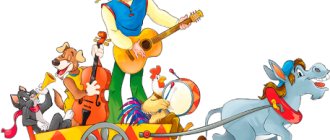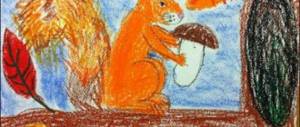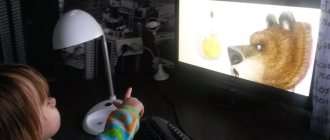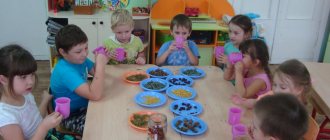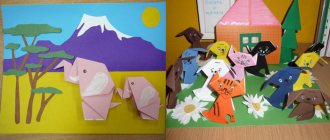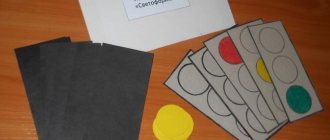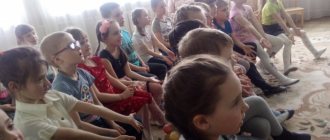Coloring pages from this collection are a great way to once again talk with your child about this very important topic. Moreover, you don’t have to read a boring “lecture”, which will still fly into one ear and immediately fly out of the other. Instead, you will have a wonderful time together coloring simple, beautiful pictures and talking about washing your hands, brushing your teeth and other hygiene procedures.
Use the power of positive associations to teach children important things. This is much more effective than forcing kids “from under the stick.”
Print out any images you like, grab your colored pencils and get to work!
We are sure your baby will definitely love it!
Didactic game “Hygiene Items”
Didactic game “Number. Sign. Subject" on the lexical topic "Hygiene items"
The game is intended for children aged 4-6 years with severe speech impairments, as well as for children of preschool and primary school age to develop the lexical and grammatical structure of speech.
Didactic game “Number. Sign. Subject" can be used both in individual and subgroup lessons with children.
Target:
This set of games will help an adult teach a child:
- agree nouns with numerals and adjectives in gender, number, case;
- select qualitative, relative, possessive adjectives for nouns;
- use ordinal numbers in speech, coordinate them with nouns and adjectives in gender, number, case;
- activate mental activity, associative thinking;
- make comparative sentences with the conjunction “a”.
Material for the game:
cards with game tasks in two subjects of the same lexical group; playing field and cut cards for independent selection and compilation of a plot series; sets of numbers.
Game description:
Game with ready-made models : each table contains tasks for two subjects of the same lexical group for a larger educational load. At the beginning of the game, the child needs to be clearly shown how associations can be used to indicate the characteristics of objects. For example, how can you depict a bitter taste, show the hardness, softness, juiciness of vegetables, color and shape.
Below are ready-made game cards:
- one blue plastic comb;
- three pink toothbrushes;
- two pink plastic soap dishes;
- five blue soft washcloths;
- three children's toothpastes;
- six foamy women's shampoos;
- one red soft towel;
- three cotton handkerchiefs.
The game requires compliance with the following steps:
- Name a word denoting a number (what number? - two).
- Name a word denoting an object (what is this? - soap dish).
- Agree the noun with the numeral in gender (how many soap dishes? - two soap dishes).
- Name the words denoting the attribute of an object, coordinate them with numerals and nouns in gender, number (two soap dishes (which ones?) - pink, plastic).
- Agree the numeral with the adjectives and nouns in gender and number. (Say in a complete sentence, starting with the number. – Two pink plastic soap dishes.)
- Using the same principle, consider another item of the lexical group - a washcloth.
- Make comparative sentences with the conjunction “a”. (Soap dishes - two, washcloths - five, etc.)
Game with cut cards : played on the same principle as with ready-made models. Only here the child takes an active position and is given more independence.
First, you should invite the child to choose an item on a lexical topic and place it in a sector with an asterisk, then a number (place in the first sector) and select adjectives in the form of picture symbols (place in the longest sector of the playing field). The symbol pictures are first reviewed and what they mean is explained.
To better understand the progress of the game with cut cards, a sample is provided below.
Using the didactic game “Number. Sign. Subject" children will quickly master the skills of agreeing adjectives, nouns and numerals in gender, number, case; will learn to select adjectives for nouns and develop their associative thinking.
The development of associative thinking has a positive effect on the process of memorizing and reproducing necessary information.
On our website you can find other educational games from the “Number” series. Sign. Item". To do this, follow the highlighted link .
We wish everyone success.
Summary of lessons in kindergarten in the middle group. Personal hygiene
Lesson notes on the rules of personal hygiene in kindergarten.
Middle group Goal : consolidate children's knowledge about the rules of personal hygiene and maintaining their health. Objectives: to convey to children the importance of hygiene, to encourage children to maintain a healthy way of thinking;
introduce the rules of personal hygiene; cultivate a desire to be neat, clean and tidy; Develop the habit of taking care of your appearance, washing yourself, washing your hands with soap before eating, when dirty, and after using the toilet; To consolidate children's knowledge about personal hygiene items: comb, soap, towel, toothbrush, washcloth, handkerchief and the skills of their use. GCD
Guys, this morning I heard the following phrase: “Cleanliness is the key to health.” What do you think this means?
(children’s answers: you need to be clean, you need to wash your hands before eating, you can’t put your hands in your mouth, you need to brush your teeth) Let’s imagine an unkempt, sloppy boy. He rarely washes his hands with soap, does not like to cut his nails or comb his hair, does not wash his things, and always walks around dirty. Would you like to be friends with such a boy? What do you call a boy who doesn't like to wash his face? (dirty, slob, pig) Even his personal belongings did not want to be friends with such a boy, and they ran away from him. Now I’ll read you a fairy tale about this boy. The fairy tale is called “Moidodyr” Reading the fairy tale by K. Chukovsky “Moidodyr”. Questions about the work Questions about the fairy tale: - Guys, why do you think all the things ran away from the boy? - What can you call this boy? Children's answers - (Slob, dirty....) - Correct. What should you do to avoid becoming like this boy? Children's answers - (Wash your hands, wash your face, bathe, clean and wash your clothes, comb your hair.) - Who made the boy wash his face and how? —What does the verse teach you? - Is it good to be dirty? — Do people around them love children who don’t wash themselves or wash themselves? Physical education lesson We need, we need to wash ourselves - clapping. Where is clean water here? - hands forward Let's open the tap sh-sh-sh - imitation of the movement Wash my hands s-s-s - imitation of the movement We will rub our cheeks, neck - imitation of the movement And pour some water - “pouring” the face. Breathing exercises Now let’s take soap in our hands: We will soap our hands, - imitation of movement (inhale through the nose) - One, two, three - (exhale when pronouncing). (inhale through the nose) - One, two, three - (when pronouncing, exhale). And above the hands, like clouds, there are pops Bubbles, bubbles - inhale through your nose, blow into your hands Riddles And now I want to test you, do you know what supplies you need to maintain hygiene And it shines and glitters It doesn’t flatter anyone. And he will tell anyone the truth - Everything is as it is, it will be shown to him (the mirror) Slipping away like something alive But I won’t let him out. Foams with white foam Don’t be too lazy to wash your hands (soap) Plastic back. Stiff bristles. He is friends with toothpaste Serves us diligently (toothbrush) I wipe, I try After the boy’s bath Everything is wet, everything is wrinkled There is no dry corner (towel) As many as 25 teeth For curls and tufts And under each tooth Hair will lie in a row (comb) There are four corners , You blow your nose at me. /handkerchief/ Self-massage: “Wash, wash the chimney sweep - rubbing the palms Clean, clean, clean, clean! - stroking the face Will, will, chimney sweep - circular stroking of the stomach Clean, clean, clean, clean!” - tapping feet with fists. Drawing Guys, you are great, you know the rules of personal hygiene, and I really hope that you will follow them. And now I offer you the hygiene items that you use to depict. Reflection
We recommend watching:
Outline of GCD for children of the middle group. Wild animals GCD outline for children of the middle group. My Homeland GCD outline for preschoolers of the middle group. Topic: Transport Summary of the GCD for children of the middle group “Geometric Kaleidoscope”
Similar articles:
Summary of lessons in kindergarten in the middle group. Profession rescuer
Summary of a lesson in kindergarten “Properties of wood.” Middle group
Lesson notes for the middle group of kindergarten
Lesson in the middle group of kindergarten. Professions of rural people
Lesson in the middle group on social and communicative development
Lesson on cognitive activity “Personal hygiene items”
Target:
- Clarification and concretization of ideas about personal hygiene items, consolidation of the skill of their use. Improving the grammatical structure of speech (coordination of adjectives with nouns), the ability to answer questions.
- Development of coherent speech, visual attention and perception, fine motor skills, coordination of speech with movement, general speech skills.
- Formation of the ability of collective interaction, friendly relationships between children.
Material:
hygiene items in the basin: soap, washcloth, comb, towel, toothbrush; “The Fourth Odd One” punch cards for each child, a Katya doll, toothbrushes for each child, a letter from Moidodyr, an audio recording.
Progress:
1. A teacher enters the group and says to the children: “Today I received a letter to all the children about one very important matter.” Want to know who it's from? Guess:
He is the commander of washbasins and the commander of washcloths.
And if you are lazy to wash, he will wash you to the holes.
He will take gentle, fragrant soap, and he will wash you thoroughly and cleanly. He will brush your teeth with powder and comb your teeth.
- That's right, this letter is from MoYdodyr. This is what he writes: “My dear children! I am writing you a letter:
I ask you to wash your hands and face often.
It doesn’t matter what kind of water: boiled, spring,
From a river, or from a well, or just rain! You must definitely wash in the morning, evening and day, before every meal, after sleep and before going to bed.”
2. - And Moidodyr also asks if you wash your hands and face? When?
Why do you need to do this? (children's answers). Let us now talk about cleanliness, and what is needed for this, so that we do not feel ashamed in front of Moidodyr, who cares so much about our health.
If you answer all my questions correctly, you will receive gifts from MoYdodyr. Agreed?
The children sit at the tables. An audio recording of the final song from K.I. Chukovsky’s fairy tale “Moidodyr” is played.
3. - Children, in front of you are cards with objects drawn on them.
Look at them and think about what you need from the drawings to maintain cleanliness. Cross out what you don't need.
Children work with punch cards.
4. - Children, in order to be clean and neat and never get sick, you need to have personal hygiene items and be able to use them. Now I will tell you riddles about personal hygiene items, and you listen carefully and guess:
1. It slips away like something alive, but I won’t let it go.
It foams with white foam, I’m not too lazy to wash my hands. (soap)
2. I wiped, tried to wipe the boy after the bath.
Everything is wrinkled, everything is wet, there is no dry corner. (towel)
3. The tail is made of bone, and there are bristles on the back. (Toothbrush)
4. Whoever is our best friend will wash away the dirt from our faces and hands. (water)
5. Elastic band Akulinka went for a walk on the back.
She's going to wash the back until it's red. (washcloth)
6. As many as twenty-five cloves for cowlicks and tufts. (comb)
- Well done, children, you guessed all the riddles correctly. And here are the answers. The teacher takes out a basin from under the napkin
with
all the clues.
5. The teacher takes objects out of the basin one by one and examines them together with the children.
- What towel? (big, soft, beautiful, terry, fluffy, etc.)
- What soap? (pink, fragrant, smooth, fragrant, etc.)
What comb? (large, blue, rare, plastic, etc.) Etc. about all subjects.
6. The teacher performs various actions with a washcloth, soap,
water and invites the children to remember its actions.
- What did I do? (soaked, soaped, rubbed, squeezed, dried, etc.) The teacher asks the children to answer in complete sentences.
7. Dynamic pause.
Clear water is flowing (hands forward, bend over, reach for your hands)
We know how to wash ourselves (straighten up, make circular movements with our palms
faces)
Take the white paste (tilt to the right side with your arm outstretched) Brush your teeth firmly (movements simulating brushing your teeth) Wash your neck (hands behind your neck), wash your ears (palms to your ears)
Afterwards, dry yourself off (sit down, stand up, tilt your face towards your palms).
8. — Now let’s play a game called “Top-closh.” If you want to say “Yes”, then you clap your hands, and if not, then you stomp. There is no need to talk or shout anything. Be careful. So let's begin.
a) wipe their face with a towel... (clap)
b) soap cleans teeth... (top)
c) comb with a toothbrush... (top)
d) wash the body with a washcloth... (clap)
9. - Oh, who is this dirty guy who came to visit us? This is Katya doll.
Why are you so dirty? - I don’t want and won’t wash, because the dirt on my body protects me from diseases and germs, and if I wash, I’ll immediately get sick. Like this!
- Children, is the Katya doll right? And what do you think? Is it true that cleanliness can make you sick? Tell Katya why you need to wash. (children's answers)
— Children also know a lot of proverbs about cleanliness, and now they will tell you:
- In a healthy body healthy mind.
- He who is neat is liked by people.
- Wash yourself more often, don’t be afraid of water.
- The soap is gray, but the wash is white.
- The soap will foam, the dirt will go somewhere.
- Wash your hands more often, all the dirt will be washed away with water.
- Where there is cleanliness, there is health.
- Well, Katya, do you understand now that you need to wash yourself every day?
Take these personal hygiene items from us as a gift and next time come to us clean and tidy. Do you promise?
Children say goodbye
with
doll Katya.
- Children, I think that Moidodyr would be pleased with your knowledge about cleanliness and hygiene. Therefore, you can receive gifts from him. He sent each of you a toothbrush.
The teacher hands the children a brush and sums up the lesson.
